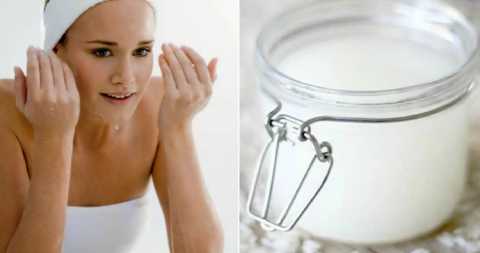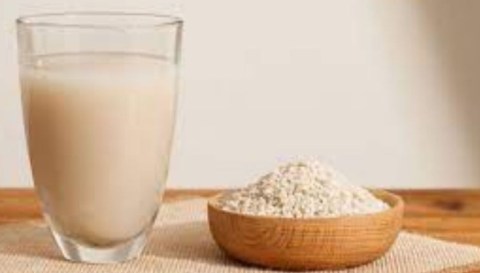7 Benefits of Rice Water
DID YOU KNOW… rice water is one of grandma’s best-kept secrets to take care of your face and hair? It also helps with stomach problems, diarrhea, skin blemishes, and rashes? That’s because RICE WATER has powerful properties and excellent benefits.
This article will provide valuable information about rice water, its properties, and its benefits for hair, skin and more. We’ll also show you how to prepare rice water to care for your beauty, hair growth and prevent diseases.
WHAT IS RICE WATER?
Rice is the seed of the grass species Oryza sativa (Asian rice) or less commonly Oryza glaberrima (African rice). Rice water is a suspension of starch obtained by draining boiled rice or boiling it until it is completely dissolved in water.
Rice water contains antioxidants that improve skin hydration, elasticity, and prevents the formation of wrinkles.
Rice provides more than 15 essential vitamins and minerals, such as folic acid, B vitamins, potassium, magnesium, selenium, fiber, iron, and zinc.
Rice water has long been used as a home remedy to control diarrhea, especially when liquid stools accompany this digestive discomfort. Its therapeutic action is due to the starch it contains.
Many mothers feed their babies rice water before introducing any puree into their diet. It is also used to relieve constipation in babies, children, and adults.
Read on to learn more about the benefits of rice water.
7 GREAT BENEFITS OF RICE WATER
To our amazement, the benefits of rice water are varied:
1.- Skincare
2.- Hair care
3.- Controls diarrhea
4 .- Control constipation
5 .- Auxiliary in breastfeeding.
6 .- Controls high blood pressure.
7 .- Helps prevent cancer
1. RICE WATER PROTECTS THE SKIN
Rice water possesses an antioxidant called aminobenzoic acid.
Some scientific studies suggest that this compound could also help prevent melanoma, a type of skin cancer.
It has many antioxidants and is a powerful natural bleach for spots caused by hyperpigmentation caused by the sun, cloth, or hormonal spots.
Its consumption stimulates the production of vitamin B3, which contributes to skin whitening naturally.

HOW TO APPLY THE RICE WATER FACIAL TONIC?
The process is effortless; follow these steps:
First step:
Wash your face to remove impurities and traces of makeup. Use a mild soap with neutral pH and warm water, and dry the skin with a soft, clean towel.
Second step:
With a cotton pad or soft gauze, apply the rice water all over the skin of the face. Leave it for 15 to 20 minutes and remove it with a damp washcloth or a cloth dampened with lukewarm water.
In a few days, you will notice the changes!
WONDERFUL EXFOLIATING LOTION WITH RICE WATER
To create an effective exfoliating lotion, you need:
Ingredients:
- 3 tablespoons of rice water.
- 1 tablespoon of sugar.
Preparation:
Mix both ingredients and apply the mixture to your face in a circular motion. It is necessary to use your fingertips in a circular motion.
Massage gently into the skin for 15 to 20 seconds. Leave for 10 minutes and rinse your face with plenty of warm or cold water.
*This exfoliating lotion effectively removes impurities from the skin and helps restore radiance and freshness.
PREVENTING PREMATURE AGING
Some scientific studies suggest that it improves skin hydration and elasticity and prevents the formation of wrinkles and expression lines.
- Rice water works by inhibiting the action of elastase and tyrosinase, which are enzymes involved in premature aging.
- It improves the appearance of pores and adds shine.
- It smoothes the texture of the complexion.
- Moisturizes and soothes skin irritation and redness.
- Rice starch is beneficial in relieving skin eczema and annoying rashes.
2.- CARES FOR THE HAIR
Rice water has several compounds with antioxidant properties, such as inositol, ferulic acid, and gamma-oryzanol, that prevent damage caused by free radicals in the cell.
It helps to repair hair damage, protecting it from aggressive substances, such as UV rays or pollution, favoring its healthy growth.
3.- CONTROLS DIARRHEA
Rice water is an excellent home remedy to treat diarrhea in all ages, including babies, as it can regulate the intestine and prevent dehydration, promoting a quick recovery. Besides helping you treat diarrhea and constipation, it can take care of your intestinal flora.
4.- CONTROLS CONSTIPATION
Due to its high fiber content, rice water softens bowel movements. It facilitates the expulsion of stool in cases of constipation. In addition, it is essential to emphasize that its starch is beneficial for the better development of intestinal flora.
5.- AUXILIARY IN BREASTFEEDING
Rice water contains inositol or myoinositol, a member of the B-complex group of vitamins, which helps stabilize blood sugar levels. Studies suggest that it helps nursing mothers with insulin problems increase their milk production.
6.- CONTROLS HIGH BLOOD PRESSURE
Studies have shown that white rice enriched with gamma-aminobutyric acid effectively reduces high blood pressure. It is concluded that its intake may help delay or prevent the early onset of cardiovascular and cerebrovascular events related to high blood pressure.
7.- IT CONTRIBUTES TO PREVENTING CANCER
Studies have shown that rice and its by-products, such as rice water, have encouraging results in cancer prevention. The mechanism of the anticarcinogenic effect is suggested in part through the potentiation of bioactive compounds such as vitamin E, phytic acid, -aminobutyric acid (GABA), -oryzanol and phenols.
In addition, in vitro, and in vivo studies, have provided substantial evidence that consumption of rice by-products can provide optimal chemoprevention due to antioxidant phytonutrients. Further clinical studies on rice by-products and their unique bioactive compounds are promising for future use as a dietary cancer chemopreventive agent.
How to Make Rice Water for Hair Growth and Skin Care
How to make Rice Water?
Rice water is the water left over after the rice is boiled. To prepare it, you need:
Ingredients:
- Half a cup of white rice.
- 4 cups water
Preparation:
- Boil water in a pot
- When boiling, add the rice.
- Simmer for 20 minutes
- When ready, strain the rice.
- Store the water in a glass container.
Rice Water for diarrhea:
Drink 1 liter of this water daily until diarrhea disappears. The most recommended rice is boiled white rice. Besides not having fiber, it releases its starch and favors the increase of stool density. It serves as a natural rehydrating agent; that is to say, it helps you to recover the liquids lost due to the disease.
Rice Water for hair:
1.- Wash with shampoo and rinse.
2.- Apply the rice water and massage the scalp.
3.- Leave on for 5 minutes and rinse with plenty of water.
Rice Water for the skin:
Wash the face with this water or use it during the bath to cleanse the skin.
OTHER USES OF RICE WATER
RICE WATER FOR PLANTS
Yes, rice water is also used for watering plants. It is very beneficial because rice water has fertilizers and minerals that promote a healthy bacteria population, making plants grow faster.
Also, rice water is used to fight unwanted pests on plants.
BABY RICE WATER
Rice is a cereal that is easily digested and provides multiple benefits to both adults and babies. It is common to hear grandmothers recommend giving rice water to a baby to fight colic or diarrhea and also for skin eczema.
Always consult your pediatrician before administering rice water to babies.
WISE ADVICE FROM GRANDMOTHERS
One of the wisest bits of advice from grandmothers was that we should drink rice water whenever we had diarrhea, skin spots, or rashes. It was among the first recommendations because rice water works and has powerful properties.
Read on to learn more about the history of rice in Eastern culture and its ancestral significance.
RICE IN CHINA
Rice had a prominent presence in China. The sage and philosopher Confucius said, “a kitchen without rice is like a beautiful woman missing an eye.”
As a traditional crop, rice was the object of reverence and worship. Rice symbolized life and was a sign of fertility and joy. It has had medicinal and cosmetic uses since ancient times.
Rice arrived in America thanks to Christopher Columbus in 1493. It was not until 1512 that Spanish attempts to adapt it to the tropical climate bore fruit.
Adaptation to the tropical climate. Today, rice is a staple food in 60% of the world’s population and an ancestral gift for life.
CURIOSITIES ABOUT RICE
After wheat, rice is the most consumed cereal worldwide.
It is an excellent energy source for the organism and is rich in nutrients such as vitamin B.
There are more than ten thousand varieties of rice; among the best known we have: long grain, round grain, short grain, and brown.
The most expensive rice in the world is called Kinmemai Premium and is produced in Japan. It is low in calories and strengthens the immune system. There are different varieties of grains, costing about $109 per kilo.
Conclusion
Rice water cares for our skin and hair, controls constipation and high blood pressure, helps during breastfeeding, and prevents skin cancer.
It is an excellent home remedy to treat diarrhea in all ages, including babies, as it can regulate the intestine and prevent dehydration, favoring a quick recovery. Besides helping treat diarrhea and constipation, it can take care of your intestinal flora. It is known that it was in 7000 BC that rice cultivation began in Asia, between China and India. And today, we can still enjoy its great benefits!
We recommend you read: Carrot Oil For Hair Growth How Good Is It? | How to Make It and Benefits
What exactly is Hyaluronic Acid, and why does it work wonders for your skin?
What is Collagen and How to Rebuild It in the Face
References
Pulido, Rosalba et al. Composition of homemade solutions used in children with diarrhea without dehydration. Mérida – Venezuela. Venezuelan Archives of Puericulture and Pediatrics. 72. 1; 2009
Marto, Joana et al. Rice Water: A Traditional Ingredient with Anti-Aging Efficacy. Cosmetics. 5. 2; 2018
Sowinska, Marta et al. Molecular Antioxidant Properties and In Vitro Cell Toxicity of the p-Aminobenzoic Acid (PABA) Functionalized Peptide Dendrimers. Biomolecules. 9. 3; 1-21, 2019
By: Dr. Yamile Delgado de Smith
University professor, writer, writer of articles, accredited researcher, lecturer and project developer.
Post-doctorate in Education.
www.yamilesmith.blogspot.com
@yamiledesmith
Instagram: @yamiledesmith

